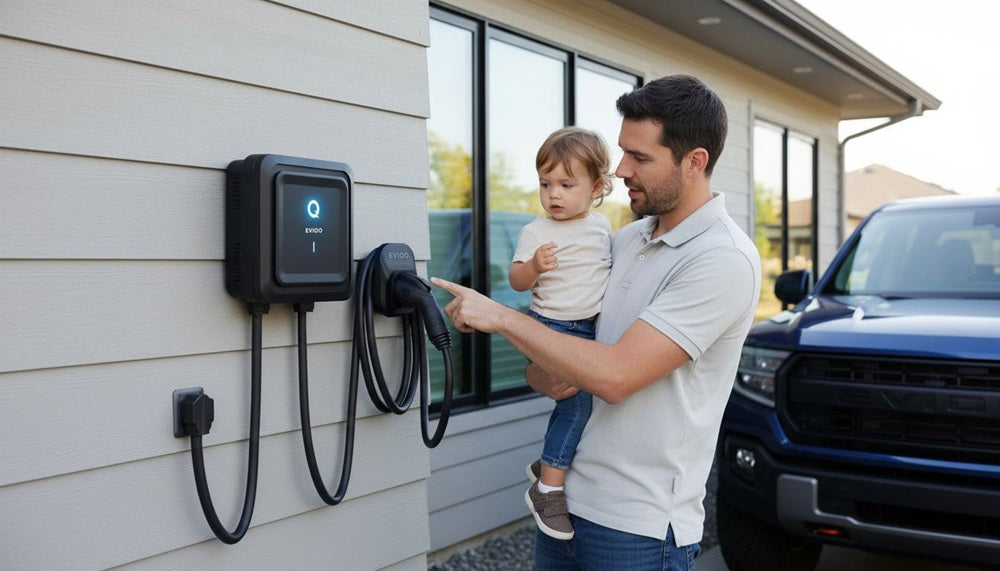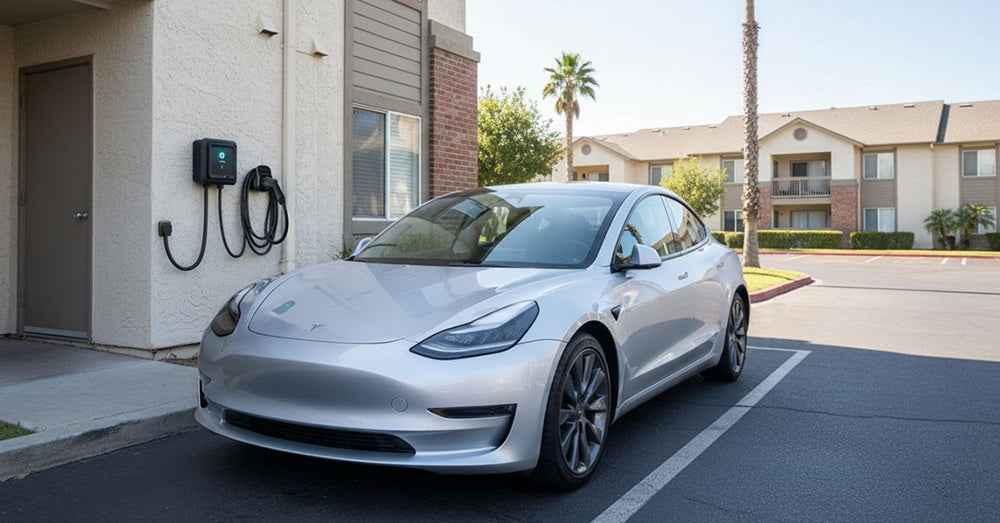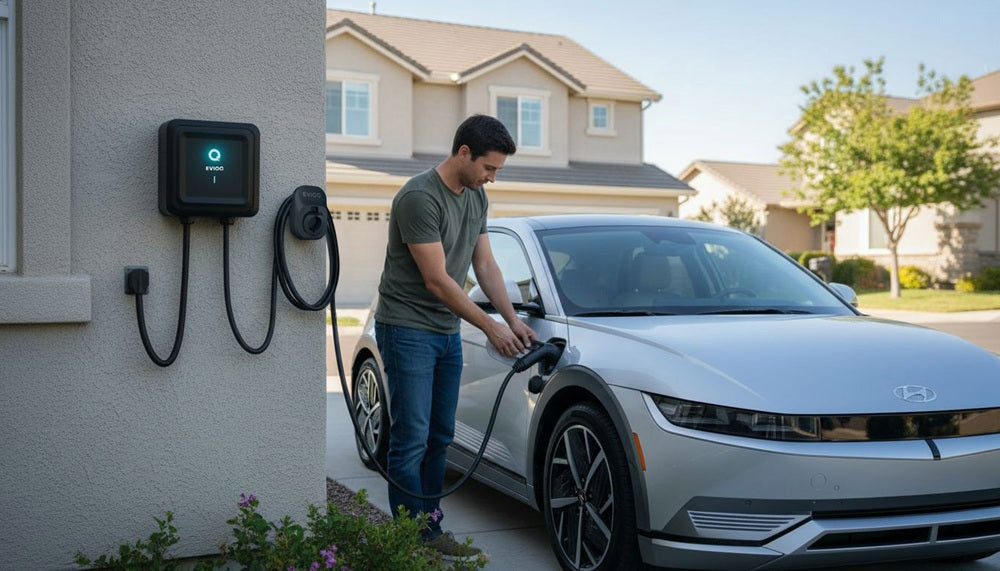ore and more people choose electric vehicles (EVs). They choose them for unmatched economy and convenience. No more waiting at busy gas stations or worrying about growing fuel costs. You charge your EV like your phone. However, your new driving experience depends on the right home charger. It saves time and also reduces costs, as residential electricity is often cheaper than public charging stations.
Over 80% of EV charging happens at home, so when you have the right charger, your vehicle is ready when you are. The choice is huge. You can find various models on the market – simple plug-in chargers and those with smart features. So, what types of home chargers for electric cars are worth investing in? We have prepared short reviews of the available options. Keep reading to find the perfect charger for your lifestyle.
Three Levels of EV Chargers
EV chargers differ by speed and power levels and use different types of EV charging plugs.
They come in three EV charging levels, and here are the details:
Level 1. This is the plug-and-play model. You just plug into a standard household outlet (120 volts) and wait for the battery to recover. But it’s slow – you get around 3–5 miles of range per hour. It’s if you have short drives around town or own a plug-in hybrid. But if your vehicle is purely electric, the full charge will take almost two days.
Level 2. Most EV owners choose Level 2. It uses a 240-volt plug and charges 20–60 miles of range per hour. It’s much faster than a basic charger and is a good compromise of speed, cost, and convenience.
Level 3. These are types of chargers for electric vehicles that are also known as DC fast charging. It delivers serious power and charges hundreds of miles in under an hour. However, these models are too expensive for home use and need special equipment. You can find these at public charging stations.
|
Charging level |
Voltage |
Power output |
Range added per hour |
Typical use |
|
Level 1 |
120V |
1.2-1.4 kW |
4-8 miles |
Home, basic |
|
Level 2 |
240V |
3.3-19.2 kW |
20-60 miles |
Home, standard |
|
Level 3 |
480V+ |
50-350 kW |
100+ miles |
Public, fast |
Review of all types of EV chargers at home

Homeowners often struggle when choosing a home EV charger. So, what are the types of ev chargers? Which one should you buy? Read through these short descriptions to get an idea of key features, types of ev charger connections, and other details.
Level 1 Chargers
This is the simplest charger for an electric car. You use it like a phone charger - plug it into a regular 120V outlet, so no installation is needed. In most cases, you get it with your EV. These chargers are cheap, portable and great for short commutes or plug-in hybrids. Their downside is speed, as you will need more than a day for a full battery.
Level 2 Chargers
You will need a 240V outlet for this charger. But EV owners choose this type most often. Its main benefit is speed. You can charge most EVs overnight with it. However, you need an electrician to install a dedicated circuit. It will increase the final cost, but you will have reliable home charging in the end. If you are a daily driver, consider this option.
Smart Chargers
Smart features are Wi-Fi connection and remote control. You can pick cheaper electricity hours for charging and track how much energy you use. You can even connect your charger to solar panels or smart home devices. Even if you pay a bit more, you will save money over time.
Portable Chargers
The main plus of this type is that you can take it with you. It uses a 120V or 240V outlet, so frequent travelers can charge their EV literally during trips. Some portable chargers have 40A and are much faster than a basic Level 1 unit. Of course, they are weaker than hardwired chargers, but very practical for people who want mobility and convenience.
Solar-Ready Chargers
If all your electricity comes from your home solar panels, you may consider this EV charger. It’s eco-friendly, and charging will cost you nothing. Many of these chargers come with smart features, and you can use a remote control. If you care about your carbon footprint and energy bills, it’s the optimal solution.
Hardwired Chargers
Hardwired chargers are permanently connected to your home’s electrical panel. They’re very reliable and speedy. Such a charger uses a dedicated circuit and needs professional installation. So, you will have to pay a bit more in the beginning. But these chargers are practically maintenance-free later. So, it’s a good option.
Plug-In Chargers
These Level 2 chargers aren’t wired, but you need a 240V outlet to use them. They charge faster than Level 1 and can be unplugged if needed. So, they are handy for renters or future moves. They’re slightly less powerful than hardwired units, but they give most drivers the speed they need without permanent installation.
Chargers for 1+ Vehicle
You may have two cars in the family. Then you need a charger that can handle two vehicles at once. Such devices distribute power to equally charge several units. If you own more than one EV, it’s the best charger. Installation requires a strong electrical setup, but the convenience of charging two cars at home makes it worth it for families.
Things to Remember for Home EV Charging

There is nothing difficult about using an EV charger if it’s properly installed and maintained, but there are still a few safety rules:
- Electrical safety. Let a licensed electrician install your charger – they know EV home charger electrical requirements. If you do it yourself, you may lose your warranty or create fire hazards.
- Weather protection. EV chargers are weatherproof and designed for outdoor use. But still, it must be properly mounted and protected from physical damage. Also, inspect connections regularly as water can enter worn outlets.
- Ground fault protection. Modern EV chargers have it built in. In the event of an electrical issue, the device will cut power automatically.
- Proper cable management. Damaged cables can lead to electrical issues. So, inspect cables regularly for wear, cuts, or damage.
- Ventilation. If you install your charger in an enclosed area, check ventilation. There are no EV emissions, but chargers can overheat when they operate for hours.
- Certification. Buy only chargers with UL, ETL, and CSA certificates. They meet all safety standards in this case.
Installation Requirements for Each Charger Type
Installing an EV charger is not complicated.
Level 1 chargers are the easiest option. You only need to plug such a charger into a regular 120V outlet. It works like any other appliance you use at home. You don’t need any upgrades or additional accessories. But always check that your outlet is well grounded and not overloaded.
Level 2 chargers need a dedicated 240V circuit. Installation will cost you $500–$1,500, and if you live in an older home, you may even need a panel upgrade. Additional features will further add costs - Wi-Fi or solar-powered setups.
Renters and travelers prefer portable types of Tesla home chargers as these don’t need installation. Hardwired chargers are permanent and cost $800–$2,000. Plug-in Level 2 chargers use a NEMA 14-50 outlet, giving more flexibility but less power.
Costs and Savings: Choosing the Right Charger Type

A good EV charger needs some upfront costs, but it’s worth it. So, how much do you have to pay for different types of home EV chargers?
Level 1 chargers are the most affordable. They are often included with your EV or cost up to $300. Plus, there’s no installation needed, but remember about slower charging speeds.
Level 2 chargers are the best option for most owners. They range from $400 to $1,200 and more for the unit. Smart models with app control add around $100–$300. Installation can reach $500–$3,000 depending on wiring and your home’s electrical panel. Older homes often need upgrades, and it’s another $1,500–$3,000. Solar-integrated setups can reach $2,000–$5,000, plus the cost of panels.
Home charging pays off. On average, EV drivers spend half as much on electricity as on gasoline. Over five years, that’s several thousand fuel savings, plus 30–50% lower maintenance costs. Smart chargers save even more as they use off-peak rates.
If you add rebate programs and incentives from the state or utility companies for EV charger installation, most chargers pay for themselves within two to four years.
What Are the Best EV Home Chargers?
You will not find a definite response to this question. It depends on many things. Here’s a checklist that will help you buy the right model
- Your driving distance matters. If you drive more than 40 miles daily, you need a Level 2 charger. A simple Level 1 charger is good only for short trips.
- Check your vehicle’s maximum AC charge rate and select a charger to match.
- Find a charger to match your budget. Don’t forget the installation cost. Also, look for rebates or tax credits to save money.
- Think about smart features – they can schedule charging for off-peak hours and reduce your electricity costs.
- If you rent or plan to move, portable plug-in chargers are best for flexibility, as you can take them with you when you go.
Now you have a better understanding of what are the different types of EV chargers, and surely already understand which one would work best for you. Just remember to buy from licensed providers and invite a professional electrician for the charger installation. Make your EV driving more enjoyable!




Leave a comment
This site is protected by hCaptcha and the hCaptcha Privacy Policy and Terms of Service apply.